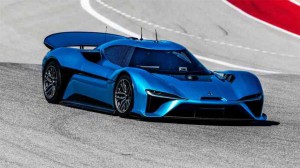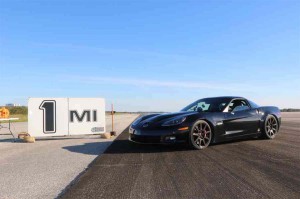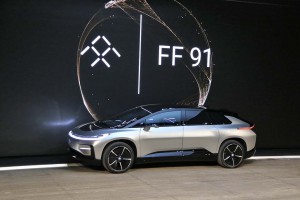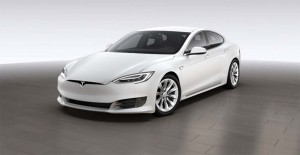Battery-carmakers are intent on proving their products aren’t just short-range bricks. A number of new models are offering not only extended range but performance. Serious performance. And they’re laying conflicting claims for being the world’s fastest electric vehicles.
Among those in the hunt for that crown are Maryland-based Genovation Cars and Chinese-owned NextEV, as well as struggling start-up Faraday Future and, of course, Tesla. There’s even a new Croatian battery-carmaker hoping to gain high-speed bragging rights, Rimac Automobili.
It’s a challenge to sort through all the claims, even when limiting one’s focus to “production” EVs, suggests Andrew Saul, CEO of Genovation Cars. “There is talk and there are results,” he said in a press release pumping the East Coast maker’s new GXE model.
Genovation claims to have broken the world speed record for fastest street-legal electric vehicle “three times in the past twelve months,.” According to the company, a test at the Johnny Bohmer Proving Grounds at the old space shuttle landing site at the Kennedy Space Center came up with figure of 209.0 miles per hour during a February 16th run. That’s up from the previous figure of 205.6 mph which was certified by the International Mile Racing Association, or IMRA.
The GXE is a heavily modified Chevrolet Corvette powered by an electric drive system producing 700 horsepower and 600 pound-feet of torque. Buyers can opt for either a seven-speed manual or an eight-speed automatic, making the GXE one of the rare battery-cars using a relatively conventional, multi-gear transmission.
While Genovation bills the GXE as a “production vehicle,” it is still in the testing stage. The company claims it will eventually produce 75 of the modified ‘Vettes.
Vying for high-speed bragging rights is the NextEV NIO EP9. The Chinese-funded company will cede top-speed honors to Genovation, the NIO only rated at a top speed of 194 mph. But it has been clocking some impressive times, nonetheless on several benchmark tracks – figures made all the more impressive during several runs in which the electric supercar operated autonomously.
The most recent: a 2:40.33 lap of the challenging Circuit of the Americas track in Austin, Texas in driverless mode on February 23rd. It cut that figure to 2:11.30 with a driver behind the wheel. On the COTA track, the NIO managed to top out at 170 mph with a driver, 160 autonomously.
The NIO EP9 managed a 7:05.12 time on the legendary Nurburgring Nordschleife, incidentally, as well as a 1:52.78 run on the F1’s Circuit Paul Ricard.
The supercar is powered by a 1,342 hp electric drive system that, NextEV claims can launch from 0 to 124 mph, or 200 kmh, in just 7.1 seconds.
There actually are production NIOs on the road – albeit just six of the $1.2 million vehicles, and all sold to company investors, so far.
Also in the testing phase is the Rimac Concept One. The Eastern European manufacturer intends to give Genovation a run for its money, claiming to have hit 220.5 mph in testing. It will hit 100 kmh, or 62 mph, in 2.6 seconds, and 200 kmh in 6.2 seconds. Rimac also claims the Concept One will yield 250 miles per charge on the street – though it will burn through its battery pack in just 20 to 25 minutes on a track.
Another contender is Singapore-based Vanda Electrics. It’s working up a sleek supercar with the awkward name, Dendrobium, that it claims will hit 60 in 2.4 seconds, and deliver a top speed of 250 mph. That’s all the more impressive considering the company’s original battery-car was designed for driving around Singapore’s crowded streets at a top speed of only about 25 mph.
(For more on the Vanda Dendrobium, Click Here.)
The Tesla Model S, by comparison, is a slug. It can “only” manage a top speed of 155 mph, though that’s by design, with an electronic limiter in place. But it’s in production now, and when ordered with the Ludicrous Mode option, it will get you to 60 mph in around 2.8 seconds, according to various testers. That puts it right up there with the likes of the Ferrari 488 GTB.
(Tesla under scrutiny after explosive crash. Click Here for the story.)
But California-based, Chinese start-up Faraday Future intends to put the Tesla to shame. It claims a prototype version of its first production model, the FF91, can manage a neck-snapping 2.39 seconds from 0 to 60, which would make it the world’s fastest street-legal model.
That is, of course, assuming the FF91 actually does get into production. The company had to halt work on the assembly plant its building near Las Vegas last autumn due to cash problems, though it insisted that it is sorting through those issues, during the debut of the supercar at the Consumer Electronics Show last month.
Like the NIO EP9, the FF91 is designed to operate autonomously, as well as with a driver behind the wheel.
Expect to see even more contenders vie for the EV performance crown. As automotive engineers are quick to note, electric motors can develop tremendous levels of torque – and they hit peak the moment those motors start turning.
One of the most outlandish bids was made last summer using a modified – but street-legal Enfield 8000. If the name’s not familiar, that’s because the little British micro-EV has been out of production for nearly four decades. A UK customizer tore out the original, 8 hp drivetrain, replacing it with an 800 hp alternative. On a drag strip, it managed to hit 113 mph in sex seconds, finishing the quarter-mile in 9.86 seconds.
Unfortunately, there are no plans to put the Enfield back into production – with either the original driveline or the new one.
(Mercedes planning to mark AMG’s 50th anniversary with debut of four new performance models at Geneva Motor Show. Click Here for more.)




